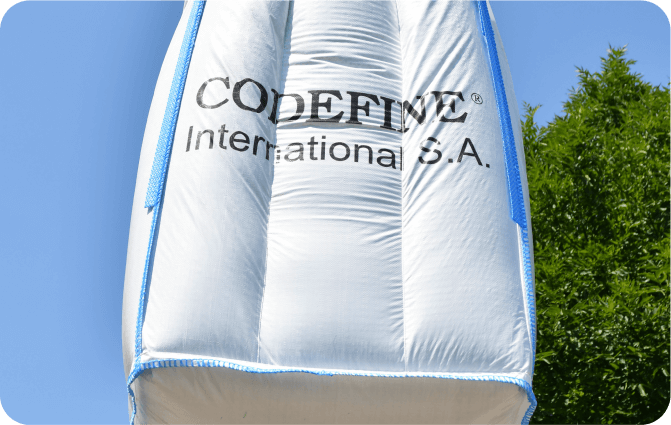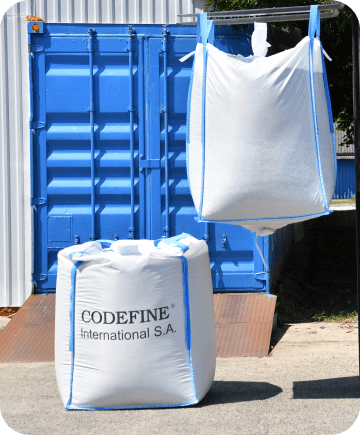Home » Posts Page » Blog » Codefine » FIBC Suppliers vs. Manufacturers: What’s the Difference and Which One Should You Work With?

FIBCs, commonly known as bulk bags, jumbo bags, or super sacks, have become essential packaging solutions across numerous industries, including agriculture, chemical, construction, food, and pharmaceutical sectors. These versatile containers can typically hold between 500 and 4,000 pounds of material, offering efficient storage and transportation for bulk products.
The global FIBC market continues to expand rapidly, with projections showing significant growth driven by increased industrial activity, cost-effective transportation demands, and sustainability initiatives. Within this growing market, both manufacturers and suppliers play distinct but complementary roles in meeting diverse customer needs.
FIBC manufacturers are companies that directly produce bulk bags in their own facilities. They control the entire production process from raw material selection to final product testing. This vertical integration offers several distinctive characteristics:
Manufacturing processes for FIBCs typically involve specialized equipment for cutting polypropylene fabric, sewing panels, adding features like spouts or liners, and final quality inspection. Manufacturers invest significantly in production infrastructure, including clean rooms for food-grade products or electrostatic dissipative technology for specialized applications.
Quality control represents a core strength of manufacturers, with in-house testing for critical safety factors such as safe working load, ultraviolet resistance, and fabric strength. Most established manufacturers maintain international certifications such as ISO 9001 and specific industry standards like AIB for food applications.
Research and development capabilities allow manufacturers to create proprietary designs, innovative features, or custom solutions for unique applications. This innovation capacity often translates into specialized expertise in specific industries or challenging packaging requirements.
Typical minimum order quantities (MOQs) from manufacturers range from 500 to 1,000 units for custom designs, reflecting production efficiency requirements and setup costs. Standard products may have slightly lower MOQs but still generally require volume commitments.
FIBC suppliers serve as distribution partners, sourcing products from multiple manufacturers to offer a comprehensive range of options to end users. While they typically don’t manufacture products themselves, suppliers provide several valuable functions in the supply chain:
Distribution networks maintained by suppliers often span multiple regions or countries, allowing them to source the most appropriate products for customer needs regardless of manufacturing location. This geographic flexibility can be particularly valuable for companies with facilities in different regions.
Inventory management represents a core capability, with suppliers maintaining stock of common FIBC designs for immediate availability. This warehousing function eliminates production lead times for standard products and provides buffer inventory for unexpected needs.
Product range and selection typically exceed what any single manufacturer offers, with suppliers aggregating options from multiple producers. This diversity allows customers to compare different specifications, features, and price points within a single source.
Value-added services frequently include consultation on appropriate FIBC selection, testing assistance, custom printing arrangements, and logistics support. Many suppliers also offer financing options, vendor-managed inventory programs, or just-in-time delivery arrangements.
Customer support infrastructure often includes technical specialists who understand application requirements across multiple industries, helping customers identify the most appropriate solutions for their specific needs.
The fundamental differences between manufacturers and suppliers affect several critical aspects of the purchasing relationship:
|
Criteria |
Manufacturers |
Suppliers |
|
Minimum Order Quantity |
Higher (500-1,000+ units) |
Lower (10-50 units) |
|
Pricing |
Lower unit costs for large orders (10-30% savings) |
Higher unit costs but better terms for small orders |
|
Lead Time |
3-8 weeks for custom orders |
Same-day to 1 week for standard items |
|
Customization |
Full design control, material selection, specialized features |
Limited to standard bags with custom printing |
|
Best For |
• High-volume, consistent needs • Specialized requirements • Long-term partnerships |
• Variable/smaller volumes • Quick turnaround needs • Product variety |
Pricing structures vary significantly, with manufacturers typically offering better unit pricing for large volume orders due to the elimination of middleman costs. However, suppliers may leverage combined purchasing power across customers to negotiate competitive pricing, particularly for standard products. Total cost analysis should consider both unit price and associated logistics, inventory carrying costs, and order management expenses.
Lead times represent perhaps the most visible difference, with manufacturers requiring production scheduling (typically 3-8 weeks) for most orders. Suppliers often maintain an inventory of standard FIBCs for immediate shipment, reducing lead times to days rather than weeks. For custom products, both partners may have similar timeframes, though suppliers might expedite through preferred manufacturer relationships.
Customization capabilities are generally stronger with manufacturers, who can modify designs, materials, and features to precise specifications. Suppliers often offer semi-customized options (such as custom printing on standard bags) but may have limitations for structural modifications unless working closely with manufacturing partners.
Technical expertise tends to be deeper but narrower among manufacturers, focusing specifically on their production capabilities and designs. Suppliers typically offer broader knowledge across multiple products, manufacturers, and applications, though sometimes with less production-specific expertise.
Quality assurance processes are directly controlled by manufacturers through in-house testing and certification. Suppliers rely on manufacturer certifications supplemented by inspection programs and quality verification systems.
Regulatory compliance support approaches differ, with manufacturers focusing on production compliance (material certifications, clean room protocols) while suppliers often provide more comprehensive regulatory guidance across multiple jurisdictions and applications.
Direct relationships with manufacturers provide particular advantages in specific scenarios:
High-volume requirements represent the most compelling case for manufacturer partnerships. Companies needing thousands of identical FIBCs annually can leverage economies of scale in production, potentially securing 10-30% cost savings compared to supplier pricing.
Custom design specifications that require unique features, sizes, or performance characteristics often necessitate direct manufacturer collaboration. This is particularly true for specialized applications like pharmaceutical ingredients, hazardous materials, or unusual dimensional requirements.
Long-term partnership benefits accumulate over time, with manufacturers often investing in dedicated production capacity, specialized tooling, or custom material sourcing for established customers. These relationships frequently include joint development initiatives that create proprietary solutions for competitive advantage.
Direct quality control provides increased visibility into production processes, material selection, and testing protocols. Companies with stringent quality requirements or highly regulated products may prefer this transparency and immediate access to production data.
Despite the advantages manufacturers offer in some scenarios, suppliers provide compelling benefits for many FIBC users:
Flexibility for varying order volumes represents a key advantage, with suppliers accommodating both small orders (sometimes as few as 10-25 units) and larger requirements. This scalability supports businesses with seasonal needs, multiple product lines, or unpredictable demand patterns.
Faster fulfillment capabilities through maintained inventory eliminate production lead times for standard products. This responsiveness can significantly reduce required safety stock and improve supply chain agility, particularly valuable in just-in-time manufacturing environments.
Broader product selection allows companies to source different FIBC types from a single partner rather than managing relationships with multiple manufacturers. This consolidation simplifies procurement processes and often provides negotiating leverage through combined volume.
One-stop shopping convenience extends beyond just FIBCs to related products like liners, pallet covers, or other industrial packaging. Many suppliers offer comprehensive packaging solutions that complement their bulk bag offerings.
Consolidated logistics benefits include optimized shipping arrangements, warehousing options, and inventory management programs. These services can reduce total landed costs and administrative burden, particularly for companies without specialized logistics infrastructure.
Making the optimal choice between manufacturer and supplier partnerships requires systematic evaluation of several factors:
|
Criteria |
FIBC Manufacturers |
FIBC Suppliers |
|
Production Capabilities |
Direct manufacturing facilities with complete control over production process |
No direct production; source products from multiple manufacturers |
|
Minimum Order Quantities |
Higher (typically 500-1,000+ units for custom designs) |
Lower (can be as few as 10-50 units) |
|
Unit Pricing |
Lower for large volume orders (potential 10-30% savings) |
Generally higher per unit, but may offer better terms for smaller orders |
|
Lead Times |
Longer (typically 3-8 weeks for custom orders) |
Shorter for standard items (often same-day to 1 week from inventory) |
|
Customization Options |
Extensive – can modify designs, materials, features, sizes to exact specifications |
Limited – typically offer standard bags with custom printing or minor modifications |
|
Product Range |
Limited to own production capabilities and specialties |
Extensive selection from multiple manufacturers |
|
Technical Expertise |
Deep knowledge of specific manufacturing processes and designs |
Broader knowledge across multiple products and applications |
|
Quality Control |
Direct oversight of production and testing |
Relies on manufacturer certifications with additional inspection programs |
|
Geographic Reach |
Often limited to production facility locations |
Multiple distribution points and broader delivery network |
|
Value-Added Services |
Limited to production-related support |
Comprehensive – consulting, logistics, and inventory management |
|
Best For |
High-volume orders, highly customized designs, long-term, consistent needs |
Variable order volumes, standard products, quick turnaround needs, and diverse product requirements |
|
Payment Terms |
Often stricter, production-focused |
More flexible, may offer financing options |
|
Inventory Management |
Typically build-to-order with limited stock |
Maintain inventory of common products for immediate shipment |
|
Supply Chain Risk |
Single source dependency |
Multiple source options provide redundancy |
|
Relationship Focus |
Production efficiency and product development |
Customer service and solution flexibility |
Volume requirements significantly influence partner selection. As a general guideline, annual usage below 500 units typically favors suppliers, while volumes exceeding 2,000 identical units may justify direct manufacturer relationships. The intermediate range depends on other factors in the decision framework.
Customization needs range from standard products to highly specialized designs. Companies requiring unique structural features, performance characteristics, or proprietary designs generally benefit from manufacturer relationships, while those needing standard bags or minor modifications (printing, basic size adjustments) can work effectively with suppliers.
Timeline flexibility varies considerably across organizations. Companies with predictable, long-term needs can accommodate manufacturer lead times, while those requiring rapid fulfillment or variable delivery scheduling typically benefit from supplier relationships with inventory availability.
Technical support importance depends on application complexity and internal expertise. Organizations with limited packaging engineering capabilities often value the broader application knowledge and consultation services that suppliers typically provide, while companies with specific technical requirements may prefer manufacturer expertise.
Budget constraints must balance unit pricing against the total cost of ownership. While manufacturers generally offer lower unit prices for volume orders, suppliers may provide better overall value when considering order management costs, inventory carrying costs, and logistics optimization.
Codefine has established a unique position in the FIBC market by combining the best aspects of both manufacturing expertise and supplier flexibility. Unlike traditional manufacturers or distributors, Codefine delivers an integrated approach that addresses the limitations of both traditional models.
Our advanced manufacturing capabilities incorporate state-of-the-art production technology with the flexibility to accommodate both high-volume standardized orders and specialized custom requirements. This hybrid production model maintains quality control advantages of vertical integration while reducing minimum order quantities and lead times compared to traditional manufacturers.
Custom FIBC solutions developed by Codefine’s engineering team leverage extensive industry experience across agriculture, chemical, construction, food processing, and pharmaceutical applications. This application-specific expertise ensures that each bulk bag solution addresses the precise performance, regulatory, and operational requirements of its intended use.
